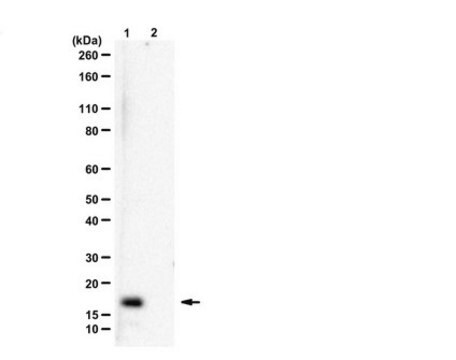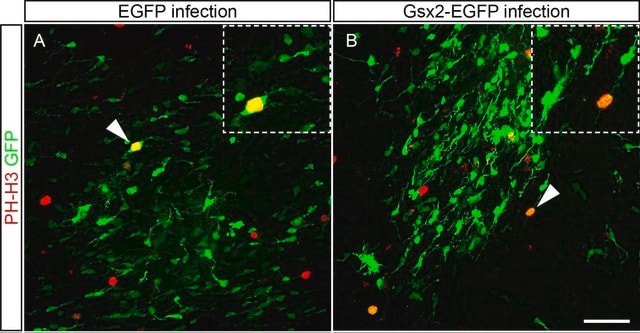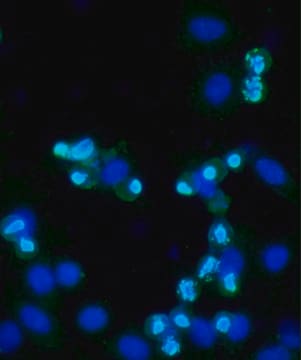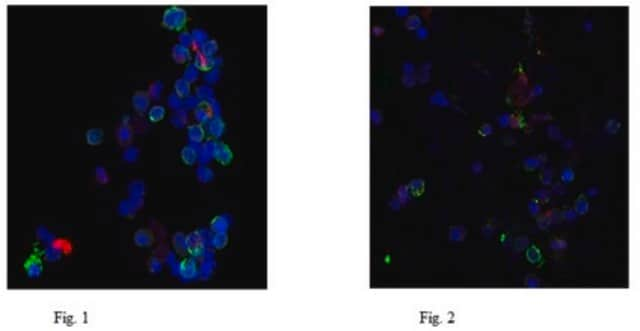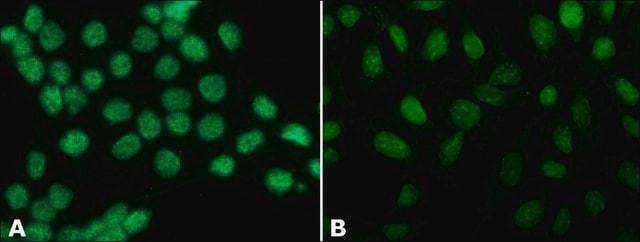Description générale
Histone H3.3 (UniProt: P84243) is encoded by the H3F3A (also known as H3.3A, H3F3, PP781, H3F3B, H3.3B) gene (Gene ID: 3020) in human. It is a highly conserved variant form of Histone H3, which replaces conventional H3 in a wide range of nucleosomes in active genes. Histone H 3.3 constitutes the predominant form of histone H3 in non-dividing cells and is incorporated into chromatin independently of DNA synthesis. H3.3 is associated with actively expressed genes in both animals and plants. It is predominantly enriched near transcription end sites (TES) of genes and positively associated with transcription. Histone H3 contains a main globular domain and a long N-terminal tail and is involved with the structure of the nucleosomes of the ′beads on a string′ structure. The N-terminal tail of histone H3 protrudes from the globular nucleosome core and can undergo several different types of epigenetic modifications that influence cellular processes. These modifications include the covalent attachment of methyl or acetyl groups to lysine and arginine amino acids and the phosphorylation of serine or threonine. For example, acetylation on Lys10 (H3K9ac; initial methionine removed) impairs methylation at Arg9 (H3R8me2s) and acetylation on Lys19 (H3K18ac) and Lys24 (H3K24ac) favors methylation at Arg18 (H3R17me). Phosphorylation at Ser11 (H3S10ph) by Aurora kinase B is crucial for chromosome condensation and cell-cycle progression during mitosis and meiosis. Phosphorylation at Ser11 by RPS6KA4 and RPS6KA5 is important during interphase because it enables the transcription of genes following external stimulation, like mitogens, stress, growth factors or UV irradiation and result in the activation of genes, such as c-Fos and c-Jun. Mutations in Histone H3.3 have been implicated in a high proportion of malignant pediatric brain cancers. The mutant H3.3 histone disrupts epigenetic post-translational modifications near genes involved in cancer processes and in brain function. Glycine 34 to tryptophan (G34W) mutations in Histone 3.3 have been linked to the development of giant cell tumor of bone (GCTB) and also in a mosaic disorder characterized by pheochromocytomas and paragangliomas. (Ref.: Amary, F., et al. (2017). Am. J. Surg. Pathol. 41(8); 1059-1068).
Spécificité
This rabbit polyclonal antibody detects G34W mutant form of histone H3.3 and does not react with wild-type H3.3.
Immunogène
Epitope: unknown
KLH-conjugated linear peptide corresponding to 8 amino acids from the N-terminal region of human histone H3.3 with a G34W mutation.
Application
Anti-Histone H3.3 G34W, Cat. No. ABE1839, is a highly specific rabbit polyclonal antibody that targets Histone H3.3 G34W mutant form and has been tested for use in Western Blotting.
Research Category
Epigenetics & Nuclear Function
Qualité
Evaluated by Western Blotting in HEK293 cells transfected with Histone H3.3 G34W mutation.
Western Blotting Analysis: 1 µg/mL of this antibody detected Histone H3.3 G34W in HEK293 cells transfected with Histone H3.3 with G34W mutation.
Description de la cible
~17 kDa observed; 15.33 kDa calculated. Uncharacterized bands may be observed in some lysate(s).
Forme physique
Affinity Purified
Format: Purified
Purified rabbit polyclonal antibody in buffer containing 0.1 M Tris-Glycine (pH 7.4), 150 mM NaCl with 0.05% sodium azide.
Stockage et stabilité
Stable for 1 year at 2-8°C from date of receipt.
Autres remarques
Concentration: Please refer to lot specific datasheet.
Clause de non-responsabilité
Unless otherwise stated in our catalog or other company documentation accompanying the product(s), our products are intended for research use only and are not to be used for any other purpose, which includes but is not limited to, unauthorized commercial uses, in vitro diagnostic uses, ex vivo or in vivo therapeutic uses or any type of consumption or application to humans or animals.
